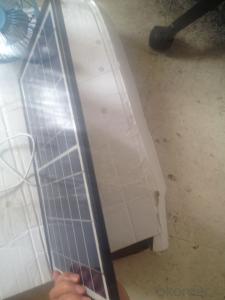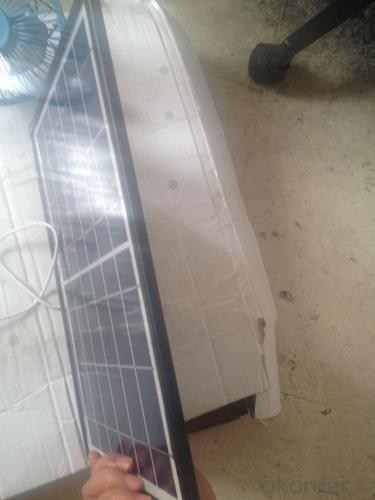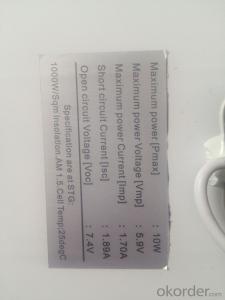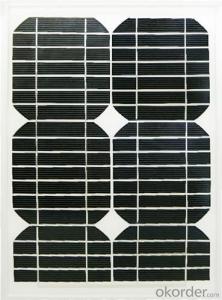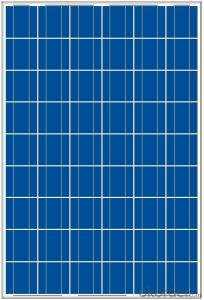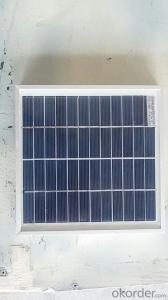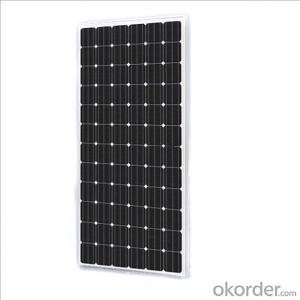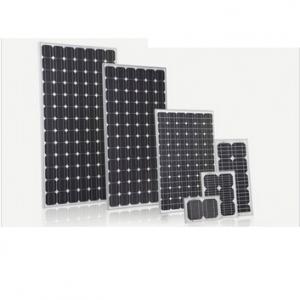10W Monocrystalline Solar Panels for Recreational Vehicles - Suitable for Solar Systems
- Loading Port:
- Shanghai
- Payment Terms:
- TT OR LC
- Min Order Qty:
- 10000 watt
- Supply Capability:
- 50000000 watt/month
OKorder Service Pledge
OKorder Financial Service
You Might Also Like
Product Description
Solar Monocrystalline Series Panels
Introduction of Monocrystalline Solar Panels
CNBM Solar photovoltaic (PV) Panel is designed for large electrical power requirements. It is the optimal choice for both on-grid and off-grid power systems. CNBM Solar panel offers high performance of power per square foot of solar array. Monocrystalline silicon(c-Si): often made using the Czochralski process. Single-crystal wafer cells tend to be expensive, and because they are cut from cylindrical ingots, do not completely cover a square solar cell module without a substantial waste of refined silicon. Hence most c-Si panels have uncovered gaps at the four corners of the cells.
Characteristics of Monocrystalline Solar Panels
I Solar Cell : High efficiency crystalline solar cell. Even if under the weak light, the solar module can produce maximum power output.
II Tempered glass (toughened glass): Anti-reflecting coating and high transmission rate glass increase the power output and mechanical strength of solar module.
III EVA and TPT: Using high quality EVA and TPT to prevent destroying and water.
IV AI frame: Without screw, corner connection. 6 holes on the frame can be installed easily.
V Junction box: Multi function junction box with water proof.
VI Long lifetime: ≥25 years; Less power decrease
VII Good performance of preventing from atrocious weather such as wind and hails.
VIII Resisting moisture and etching effectively, not effected by geology.
Standard Test Conditions of Monocrystalline Solar Panels
The opto-electrical specifications shown below are stabilized values being measured at Standard Test Conditions, Irradiance: 1000W/m2, Spectrum: AM1.5 at 25°C, The info below is subject to manufacturing tolerances. Where appropriate minutes of measurement are available and are used for the dimensioning of the installation.
Advantages of Monocrystalline Solar Panels
1.High reliability with guaranteed -3% to +5% power output tolerance, ensuring return on investment
2. High conversion efficiency based on leading innovative photovoltaic technologies
3. Withstands high wind-pressure and snow load, and extreme temperature variations
4. Attractive appearance Unique frame design, high mechanical strength, and easy Installation
Characteristics of Monocrystalline Solar Panels
Max Power Voltage Vmp (V) | 17.6V | 17.2 V |
Max Power Current Imp (A) | 0.57A | 1.17A |
Open Circuit Voltage Voc (V) | 22.6V | 22.2V |
Short Circuit Current Isc (A) | 0.61A | 1.24A |
Max Power Pm (W) | 10W | 20W |
Temperature Coefficient of Cells
NOCT | 47℃±2℃ |
Temperature Coefficients of Isc (%/℃) | 0.06 |
Temperature Coefficients of Voc (%/℃) | -0.33 |
Temperature Coefficients of Pmp (%/℃) | -0.45 |
Mechanical Data Solar Monocrystalline Series
Power | 90W/100W |
Dimension | 350×250×25mm/490×350×25mm |
Weight | 1.1 kg/ 2.0kg |
Tolerance | ±3% |
The dimension of the modules can be changed according to the demand of clients Limits.
Operating Temperature | –45 °C to +80°C |
Storage Temperature | –45 °C to +80°C |
Max System Voltage | 700V |
Guarantee Solar Monocrystalline Series Panels
Products Guarantee | 2 years free from defects in materials and workmanship |
Performance Guarantee | No less than 90% within 10yrs and no less than 80% within 25yrs |
Certificates | IEC, ISO, TUV, CE |
Dimension of Solar Monocrystalline Series Panels
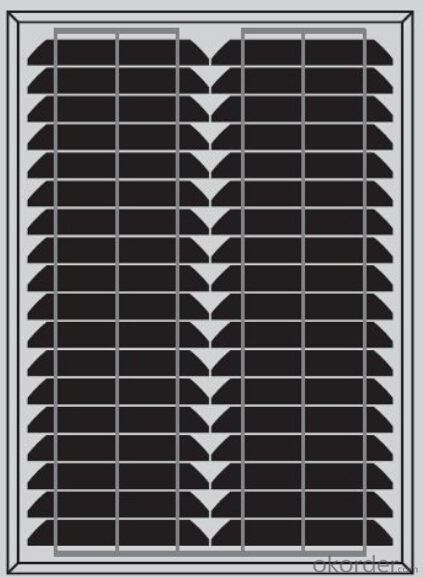
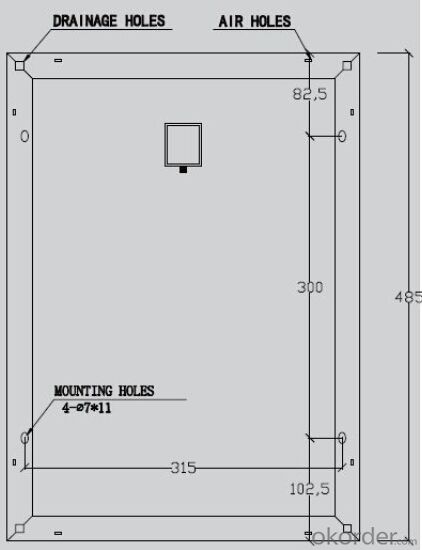
FAQ
We have organized several common questions for our clients,may help you sincerely:
1. What’s price per watt?
A: It’s depends on the quantity, delivery date and payment terms of the order. We can talk further about the detail price issue. Our products is high quality with lower price level.
2. Can you tell me the parameter of your solar panels?
We have different series of cells with different power output, both from c-si to a-si. Please take our specification sheet for your reference.
3. How do you pack your products?
We have rich experience on how to pack the panels to make sure the safety on shipment when it arrives at the destination.
4. What is your warranty system?
Our product performance guarantees for 25 years
• 12 years guarantee for workmanship
• Timeliness of delivery
• Quality Products certified (TÜV, UL, CE, ISO)
5. How do you pack your products?
We have rich experience on how to pack the panels to make sure the safety on shipment when it arrives at the destination.
- Q: Can solar panels be installed on assisted living facilities?
- Yes, solar panels can be installed on assisted living facilities. In fact, installing solar panels on these buildings can be highly beneficial as it can help reduce energy costs, promote sustainability, and contribute to a greener environment. Additionally, solar panels can provide a reliable source of renewable energy, helping to ensure a more reliable power supply for the facility and its residents.
- Q: Can solar panels be installed on factories or industrial buildings?
- Yes, solar panels can be installed on factories or industrial buildings. In fact, it is quite common for large-scale solar installations to be implemented on such structures, as they often have expansive rooftops or open spaces suitable for maximizing solar energy generation. Installing solar panels on factories or industrial buildings can help offset power consumption, reduce carbon emissions, and provide a sustainable source of energy for these facilities.
- Q: okay so im lookin 4 an article which explains how practical, wokable, feasible solar panels are. only positive points please :) give me the link. PLZ HELP!!!!
- Solar panels are comprised of several individual solar cells. These solar cells function similarly to large semiconductors and utilize a large-area p-n junction diode. When the solar cells are exposed to sunlight, the p-n junction diodes convert the energy from sunlight into usable electrical energy.
- Q: Can it be used on a cellphone so u never have to worry about low battery?
- they are a long way from producing enough electricity to keep a cell phone charged. but maybe some day in the future. but as our culture is recognizing the importance of solar electricity they are starting to mass produce solar panels and creating major problems of wast when they get old and stop producing electricity. they are super toxic and shouldnt be thrown away. they will prob have special places set of for those in the future.
- Q: im trying to run my house with with solar panels, is it possible? if so please let me know how....i have a 6000 w inverter
- There are a variety of factors that come into play in order for you to calculate the answer. Additionally, there are a number of variables that can make the answer change over time. The number of solar panels you need to install to power your home will depend upon your electric power demands, the weather in your area, the angle of your roof, shade issues from nearby trees or buildings and the size of the cells. All of these factors are important and must be built into your calculations so that you can create the best solution for your home and your future needs.
- Q: Can solar panels be installed in urban areas?
- Yes, solar panels can be installed in urban areas. In fact, urban areas provide ample opportunities for solar panel installations on rooftops, parking lots, and other available spaces. With advancements in technology and design, urban solar installations have become more efficient and aesthetically pleasing, contributing to the overall sustainability and energy independence of cities.
- Q: How do solar panels affect the environment?
- Solar panels have a positive impact on the environment as they produce clean, renewable energy without emitting harmful greenhouse gases. They help reduce air pollution, combat climate change, and conserve natural resources by decreasing our reliance on fossil fuels. Additionally, solar panels have a minimal environmental footprint during their operation and can be recycled at the end of their lifespan, making them a sustainable energy choice.
- Q: How do solar panels impact the local job market?
- Solar panels have a positive impact on the local job market as they create new employment opportunities in the renewable energy sector. The installation, maintenance, and manufacturing of solar panels require skilled workers, which leads to job growth and economic development in the community. Additionally, the transition to solar energy promotes a shift towards clean energy sources, attracting more investments and creating a sustainable job market for the future.
- Q: How do solar panels affect the overall carbon footprint of a building?
- Solar panels can significantly reduce the overall carbon footprint of a building. By harnessing clean and renewable energy from the sun, solar panels generate electricity without emitting greenhouse gases. This means that the building relies less on fossil fuel-based electricity, reducing its carbon emissions. Additionally, solar panels can offset the energy consumption of a building, further minimizing its carbon footprint, making it a sustainable and environmentally-friendly choice.
- Q: Hey was looking at a 5 watt 2 volt solar panel and was wondering if it'd be enough to power a regular light bulb. Also need to power a 5volt 6.5 amp pump for at most a minute at a time. So basically if I had this panel would I be able to plug a lamp into it and have it light for 5+ hours at a time with the possibility of running the pump? If not what size panel would I need?
- The specifications you give say the solar panel produces 5 watts at 2 volts (DC) so that isn't enough voltage to power an ordinary (20-volt) light bulb. You could get 0 of these panels and connect them in series so they put out a total of 20 volts and the total power available would be 50 watts. The panels would light the bulb that way, provided the bulb isn't over 50 watts and you can afford the panels. A panel does provide enough power for a 2-volt car light bulb less than 5 watts. However, the maximum current you can get from these panels is .25 amperes (5 watts divided by 2 volts = .25 A.) This isn't enough power to run your pump which takes 6.5 amperes - at 20 volts, that would be 780 watts. Another thing to check is the pump motor; many electric motors are designed to run on AC only and will be damaged if you try to run DC through them. Remember solar panels produce DC so the raw output from a panel will not work on an AC motor.
Send your message to us
10W Monocrystalline Solar Panels for Recreational Vehicles - Suitable for Solar Systems
- Loading Port:
- Shanghai
- Payment Terms:
- TT OR LC
- Min Order Qty:
- 10000 watt
- Supply Capability:
- 50000000 watt/month
OKorder Service Pledge
OKorder Financial Service
Similar products
Hot products
Hot Searches
Related keywords
